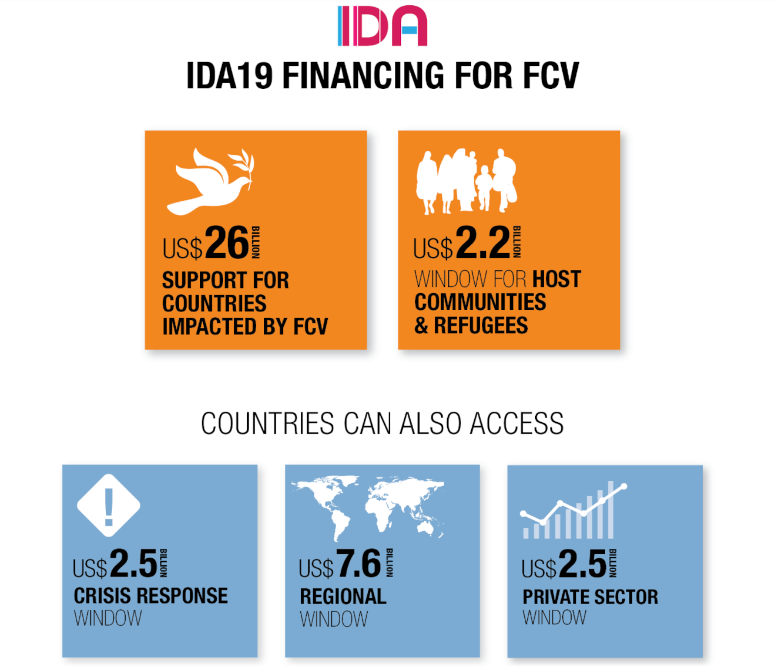CONTEXT
While extreme poverty is going down around the world, it is increasing in countries affected by fragility, conflict and violence (FCV). It’s estimated that by 2030, up to two thirds of the world’s extreme poor will live in these situations. These challenges threaten to reverse efforts to end extreme poverty, and they affect both low- and middle-income countries.
The impacts on people and economies are stark. Violent conflict has spiked dramatically since 2010 -- conflicts now drive 80% of all humanitarian needs and reduce gross domestic product (GDP) growth by two percentage points per year, on average. Social and economic exclusion, climate change, gender and other inequalities, demographic challenges, illicit financial flows and other global trends contribute to this complexity. FCV challenges do not respect country borders and often spiral into multidimensional, regional or global crises.
This surge in violent conflict has also led to historically high levels of forced displacement. Of the 82.4 million people who are forcibly displaced from their homes to escape violence, conflict and persecution, more than 26 million are refugees, the highest number recorded. Around 85% of these refugees are hosted by developing countries, and 76% of them are still displaced after five years. Such long displacements can have a devastating toll on generations of refugees and deeply impact host communities.
Against this background, the COVID-19 pandemic adds even greater stress, threatening to reverse decades of advancements in poverty reduction and development:
- Countries impacted by FCV will experience their worst recession in five decades.
- World Bank estimates show that an additional 20 million people are living in extreme poverty in countries affected by FCV.
The increasingly protracted nature of FCV situations means that in addition to essential humanitarian support, long-term development investments are needed to protect human capital, build sustainable peace and ensure shared prosperity.
STRATEGY
The World Bank was founded after World War II to support post-conflict reconstruction in Europe. It has since evolved to address challenges before, during and after crises. The 2020 World Bank Group (WBG) strategy for FCV, which applies to its work in low-and-middle income countries, articulates a development approach to FCV which emphasizes:
Helping to prevent crises by addressing root causes like climate change, government transparency and accountability, justice and the rule of law.
In areas of active conflict, staying engaged to preserve key institutions and access to basic services like health and education for the most marginalized.
Supporting countries in their transition out of conflict.
Supporting refugees and host communities.
Enabling the growth of the local private sector, particularly small and medium enterprises, which provide 80% of jobs in fragile settings.
In the context of the COVID-19 crisis, our support needs to focus on the most vulnerable – and this includes fragile and conflict-affected settings, and displaced populations. This support is focused on preventing, detecting and responding to the threat posed by COVID-19, and strengthening national systems for public health preparedness. Nearly one third of the World Bank’s projects to fight the pandemic are in fragile and conflict-affected situations.
Strong collaboration with humanitarian, development, peace and security partners is also critical to delivering results in these challenging environments.
Financing the FCV agenda
This enhanced focus on FCV is also reflected in IDA, the World Bank’s fund for low-income countries. The latest IDA19 financing package includes $26 billion in support for FCV-affected countries—a 27 percent increase from IDA18, which had already doubled financing available for FCV. These will support the priorities outlined in the FCV strategy. In addition, $2.2 billion will be dedicated to support refugees and host communities. Other IDA financing is also available to catalyze investments in the private sector, tackle regional fragility challenges and invest in crisis preparedness and response. All support is intended to tackle the medium-term economic and social dimensions of crisis situations.
